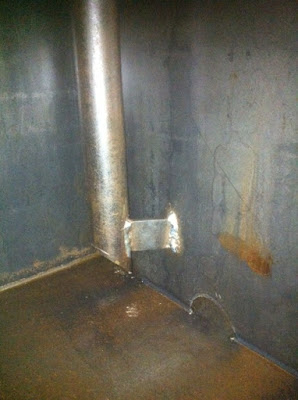Port fuel tank looking aft
I'm sure I misquote Ludwig Bemelmans "On Board Noah's Ark" when I say, "ninety percent of marine disasters are caused by dirt in the fuel" but you get the drift. So, when Dave Shaw said, "you need to clean your tanks" our options were really limited to cleaning our tanks.
Port fuel tank looking forward
Catering to our mixed readership here, I'd like to make the point that you're looking at amazingly clean fuel tanks. As old fishing boat fuel tanks go these are absolutely pristine. The Good Oyle Dr Feelgood additive these guys have sold us suppresses the rust, and this much rust isn't a problem anyway.
Filtering and polishing the diesel
When we bought Orion she had around 900 litres of diesel oil on board. That could be an asset or a liability. These Diesel Clean guys pump it all out, clean the diesel, clean the tanks, and then put it all back. The service is not cheap, but it's kind of not-optional, because nothing will stop a boat engine quicker than dirty fuel churned up in a rough sea. And when the sea is rough, that's when you really don't want your engine to stop. We just found what could be a cheaper alternative to services like Diesel Clean. In 121 Marine Centre Ltd., 3/20 Constellation Drive, Mairangi, North Shore, (09) 444 3442 you can hire a filtering machine for $75/day. You've got to find a place to do it, and get together some clean drums, which won't be clean after, and work out the value of your own time, but it could be a way to get the job done for less money. It might even be fun if you got in some mates and a few beers.
Something I want to say about Brian here. These are not the original tanks. Fishing boats have huge tanks (typically 10,000 litres) and once the boat is converted for pleasure there's really no use for all that diesel. By the time you got to burn it, it could be five years old. So it makes sense to reduce the tanks to around 1000 litres. Brian has done a brilliant job: using mild steel instead of stainless; with sumps that collect the water and dirt; and with large inspection hatches that give access. Go you, Brian. These tanks are the real deal.
While we were at it we replaced the main fuel filter and some fuel lines. It could be said this is the one most important thing on board a motor vessel... more important than the rudder, because without any thrust the rudder will be kind of redundant. So, while the Gardner 8LXB is reported to cruise at 1100 rpm for a thrifty 11.5 litres/hour it could easily ask for twice that going into a headwind with the handle down. Hence the big Racor.





No comments:
Post a Comment